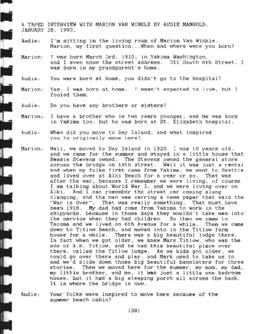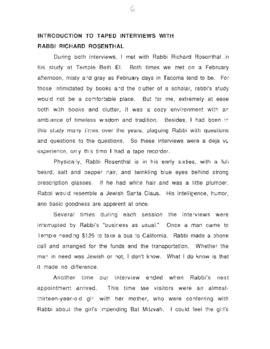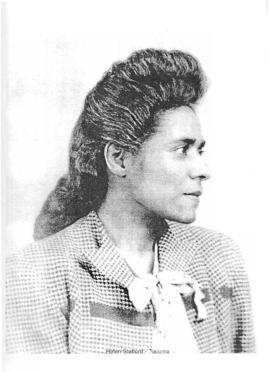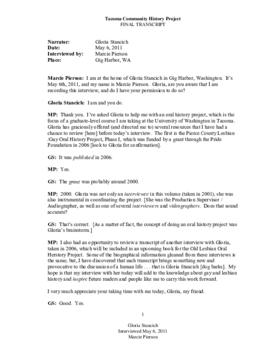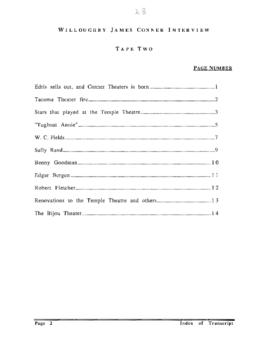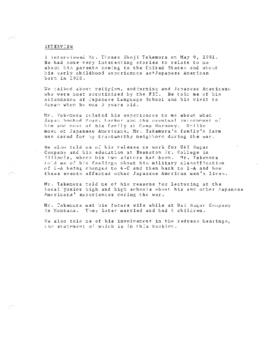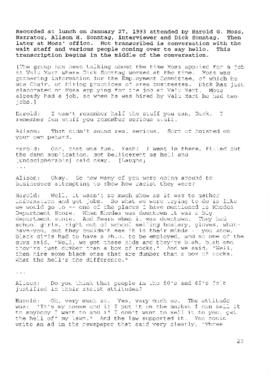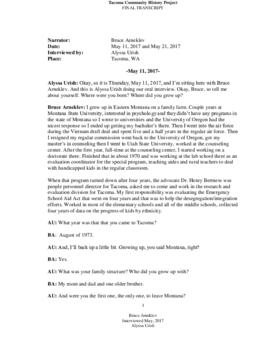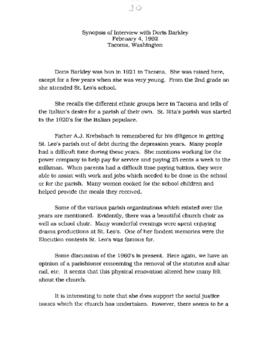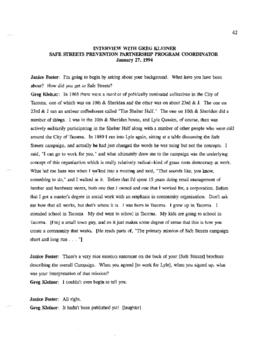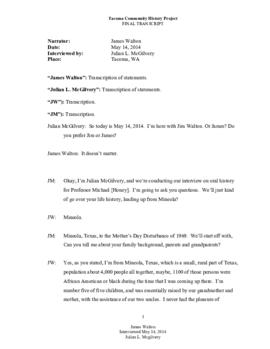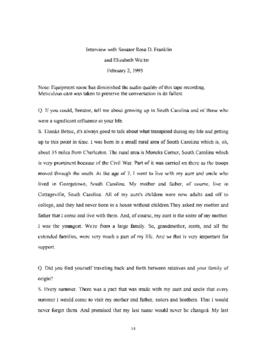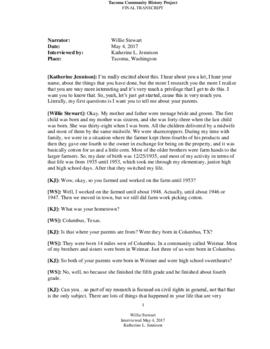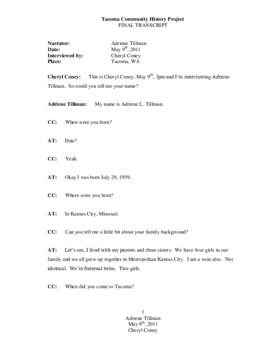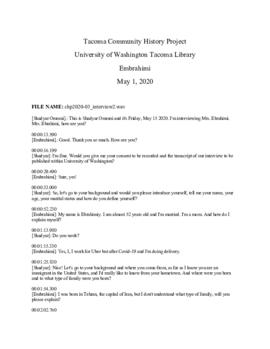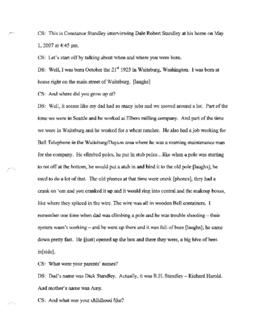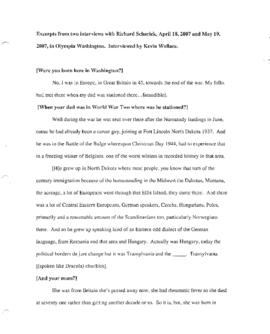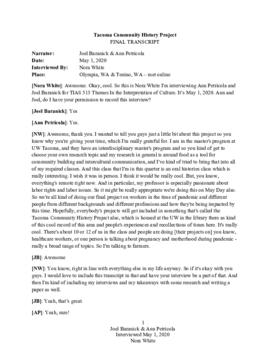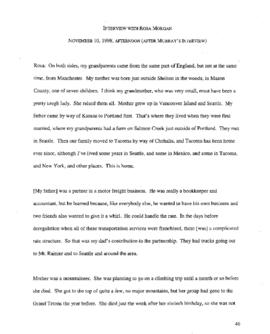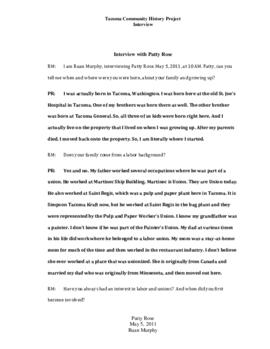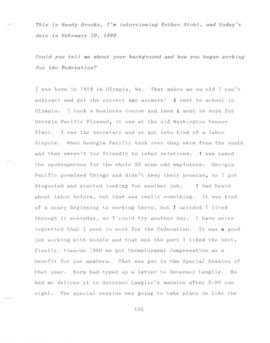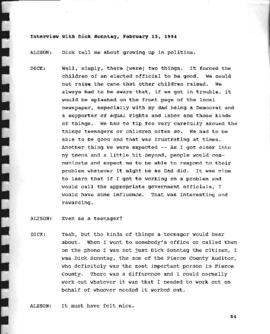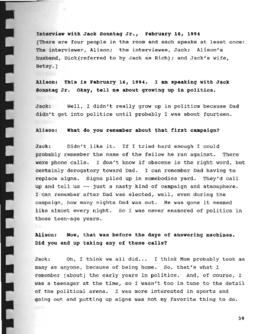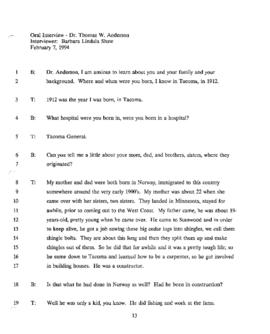Showing 230 results
Collections153 results with digital objects Show results with digital objects
Actions Speak Louder Than Words: Helen Cecile Beck Stafford
- Item
- 1993
Oral history interview with Helen Stafford by Helen I. Gilmore conducted 02/06/1993. Community leader Helen Stafford shares her life story, describing her childhood in Kansas and her experiences as a young African-American woman in Depression-era Tacoma. Reflecting back on over sixty years of civic involvement, Stafford comments on her work with the Matron's Club, the NAACP, the Alpha Kappa Alpha sorority, and the Washington Public Employees Association labor union. She also provides numerous insights into the changing face of Tacoma after World War II.
Splendid Gestures: Gloria Stancich and the Gay/Lesbian Community in Tacoma
- Item
- 2011
Oral history interview with Gloria Stancich by Marcie C. Pierson conducted 05/06/2011. Includes highlights from the personal story of Gloria Stancich, longtime civil rights activist and community leader, are discussed and placed in historical context. An active participant in numerous LGBTQ organizations, Stancich describes her path to civic involvement and personal acceptance, which includes a marriage, divorce, and eventual coming out to her son and family.
Oral history interview with Thomas Shoji Takemura
- Item
- 1991
Oral history interview with Thomas Shoji Takemura by Susan Stout conducted 05/09/1991. The interview recounts Thomas Shoji Takemura's early childhood and family life on a truck gardening farm in Fife, Washington before the start of the Second World War, as well as their forced evacuation to the Assembly Center in Puyallup, Washington. Takemura's experience of camp life is recalled in some detail. During this time, neighbors agreed to take care of the family's property. Takemura eventually obtained a release to work at a U & I factory processing sugar beets in Chinook, Montana, where he met his future wife. He also discusses his involvement in the national redress movement and related lecturing at local area schools.
Perspectives on Tacoma School Desegregation: From Family Values to Program Evaluation
- Item
- 2017
Oral history interview with Bruce Arneklev by Alyssa Urish conducted 05/11/2017,05/21/2017. Born in rural, eastern Montana, Bruce Arneklev, 79, can be seen as an unlikely match to have led the Tacoma School District's desegregation program evaluation in the 1970s. Arneklev earned his bachelor's and master's degrees at the University of Oregon and his Educational Doctorate in educational psychology at Utah State University before moving out with his family of five for an evaluation role with the Tacoma School District. Arneklev was hired to evaluate the district's Emergency School Aid Act for its first four years, 1973-1977. ESAA was a federal program that funded school desegregation efforts. Tacoma began voluntarily desegregating its schools in 1966 with a limited school choice enrollment for its segregated central-area schools and expanding to district-wide enrollment policies to reduce effects of de facto segregation over the next three years. Arneklev worked for an additional twelve years in the district's evaluation department before working as a school psychologist for ten years, retiring in 2000. He lives in the North End of Tacoma with his wife, Dixie, dog, Charlie and has several children and grandchildren in the Tacoma area.
Senator Rosa D. Franklin: Small-Town Person, Big-City Activist
- Item
- 1995
Oral history interview with Rosa Franklin by Elizabeth Walter conducted 02/02/1995. Washington State Senator Rosa Franklin talks about her nursing career and her political involvement at the local and state levels. She touches on her work with the Hilltop Children's Clinic and other outreach healthcare programs and addresses issues relating to health care reform and the nursing profession. Throughout both interviews, she emphasizes the importance of maintaining healthy communities and encouraging citizens to take a more active role in the political process.
- File
- 1994
Oral history interview with Bertil E. Johnson by John Kingery conducted April-May 1994. In this set of interviews, retired Washington State Superior Court judge Bertil Johnson discusses his legal and civic careers, particularly his involvement with the Tacoma Boys Club and his time as presiding judge for the Pierce County juvenile court. He comments on some of the federal and local changes made to the juvenile court system in the 1970s and also touches briefly on some events from Tacoma history, such as the blizzard of 1950 and the adoption of the new city charter.
Engaging Tacoma Buddhism: Acculturation at the Tacoma Buddhism Temple
- File
- 2019
Oral history interviews with Crystal Inge, Mikyoko Kanda, and Donna Sasaki by Connor Peterson, Yina Finch, and Megan Packer conducted 04/16/2019, 04/28/2019, 04/30/2019. In April of 2019, a Pacific Lutheran University Religion 393 class set out to interview members of the Tacoma Buddhist Temple with the purpose to study the acculturation of religion and the ways that the role of religion in the Tacoma community has changed overtime. The class was broken down into three groups of 3-4 students each in order to interview Miyoko Kanda, Donna Sasaki and Crystal Inge, who are all members of the Tacoma Buddhist Temple. Each person was interviewed in order to glean more information about the time period they were most active in and specific questions regarding temple culture. This project was initiated with the intent to preserve the different perspectives of the members mentioned above through oral history as an ongoing project to collect and archive oral histories of relevant members of Tacoma from its foundation to present day.
- File
- 2020
Oral history interviews with Aida Mohajer and Ebrahimi by Shadyar Omrani conducted 05/01/2020. Since COVID-19 started to become a global pandemic, it has caused personal and public traumas. Increase in unemployment rate, bankruptcy of small businesses, financial stress to the middle and working-class and the closure of many businesses which relied on peopleΓÇÖs social activities, including the gig industry, tourism industry and restaurants, are additional traumas to the issues of health and life threats people face by the contingency of the virus. By the end of May 2020, more than 2 million Americans were confirmed COVID-19 positive, 113 thousand of whom could not survive. Amongst the most affected populations, the people of color, especially Black Americans and immigrants have been suffering most. This research focuses on immigrant working women from the Middle East, whose life journeys are filled in with several traumas, some intensified during the pandemic. This paper provides two oral history records of two Iranian American working mothers, Aida Mohajer and Mrs. Ebrahimi, who carry historical traumas experienced in two different countries with two different cultures, i.e. Iran, and the USA. The intervieweesΓÇÖ stories show how the experience of trauma is related to the social class and what imposed social factors beyond choice can determine the class and different approaches to traumas.
The U.S. Navy During World War II: One Mans Experience
- Item
- 2007
Oral history interview with Dale Standley by Constance Standley conducted 05/01/2007. Dale Standley discusses his U.S. Naval career and describes life aboard the USS Hatfield, a destroyer that patrolled the North American west coast during World War II.
- Item
- 2007
Oral history interview with Richard Scharick by Kevin Wallace conducted April-May 2007. Richard Scharick recounts some of the major legislative events that took place during his time as Assistant Sergeant-at-Arms for the Washington State House of Representatives. Areas of focus include the 1989 Omnibus Drug Bill and Scharicks own political philosophy.
A Blue Collar Town: The Tacoma Labor Movement
- File
- 1993
Oral history interview with Ottilie Markholt by Kendra Fitzpatrick conducted February-March 1993. Ottilie Markholt talks about her involvement with various Pierce County labor unions, including the Metal Trades Council and the Office Employees Union, and shares some historical perspective on the Tacoma labor movement. A noted author and historian, Markholt also describes her efforts in chronicling the histories of individual union chapters and their national affiliates and provides commentary on a series of photographs showcasing union activities during the 1920s, 1930s, and 1940s.
The History of Murray and Rosa Morgan
- File
- 1998
Oral history interviews with Murray Morgan and Rosa Morgan by Amy L. Adams conducted 11/10/1998. Murray and Rosa Morgan share their life stories, recalling key events from Tacoma's history and reflecting back on their numerous adventures around the globe. Murray discusses his sixty-year career as a journalist and historian, including his time as a night news editor for CBS in New York and his time as a U.S. Army code clerk stationed in the Aleutian Islands. In the second interview, Rosa describes her eclectic career as a proofreader, copy editor, photographer, teacher, researcher, and reference librarian.
Patty Rose, Pierce County Central Labor Council
- Item
- 2011
Oral history interview with Patty Rose by Ruan Murphy conducted 05/05/2011. Patty Rose gives an overview of her nearly four decades of involvement with the Tacoma labor movement and discusses her current position as secretary-treasurer for the Pierce County Central Labor Council. She describes the PCCLCs role as an umbrella organization and talks about the specific political and educational resources that are gathered on behalf of members. She also comments on some of the pressing issues currently faced by labor unions and American workers in general, including outsourcing, rising healthcare costs, and loss of pension benefits.
A concrete look at our community
- Item
- 1994
Oral history interview with Thomas W. Anderson by Barbara Lindula Shaw conducted 02/07/1994. Dr. Thomas W. Anderson, co-founder of Concrete Technology Corporation (CTC), shares his personal history and gives an economic and historical overview of CTC, the first prestressed concrete manufacturing plant in the U.S. He discusses CTC's pioneering role in the prestressed concrete industry, its major milestones, and its philosophy of corporate responsibility.
